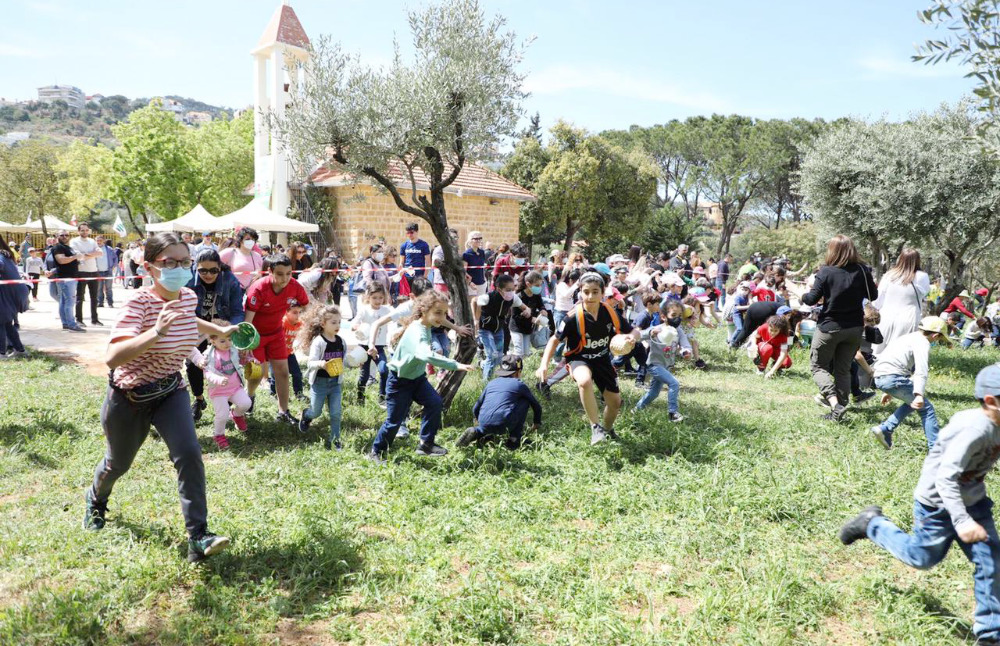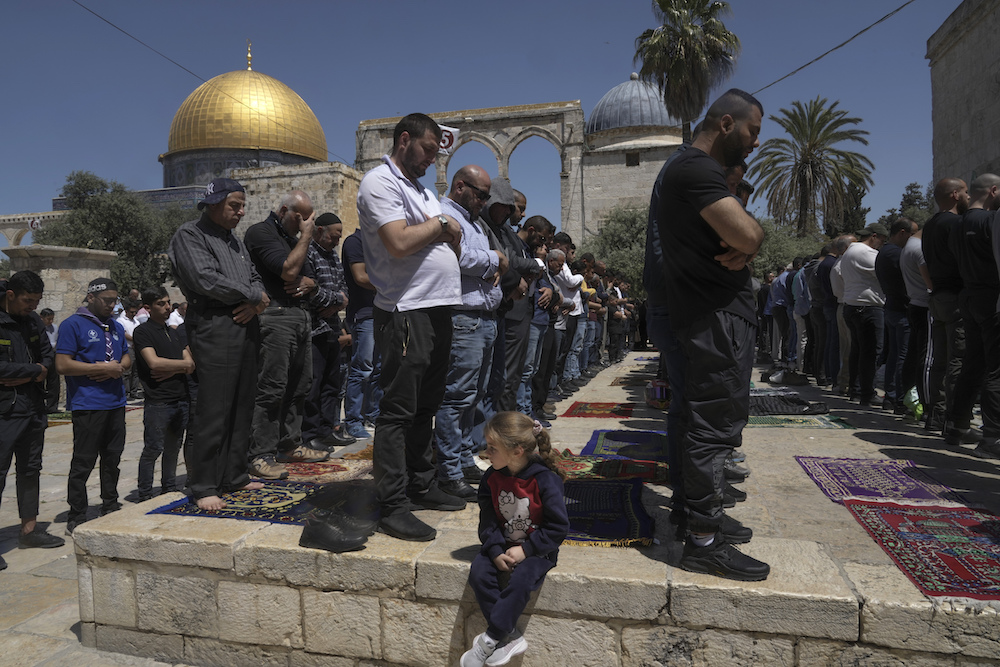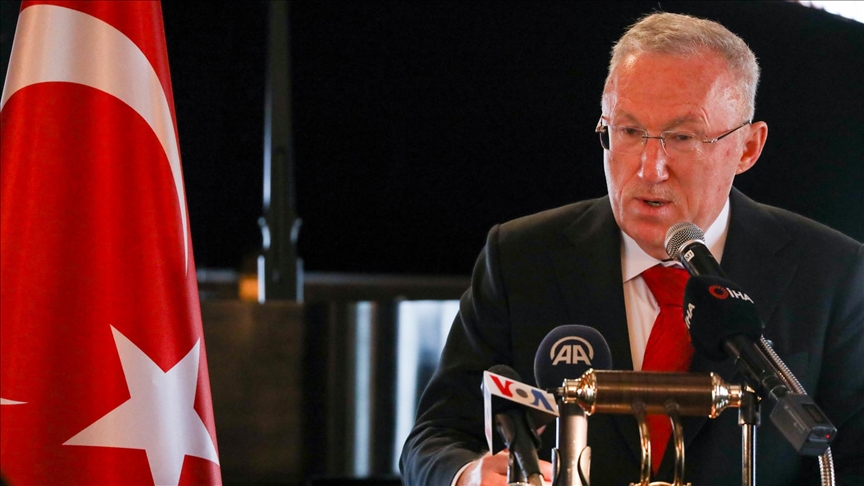Lebanese celebrate Easter amid election campaign
BEIRUT: Lebanese President Michel Aoun has assured the Lebanese that parliamentary elections will be held and that all the arrangements are ready, as people celebrated Easter.
He took part in the Easter Mass, which was led by Maronite Patriarch Bechara Boutros Al-Rai in Bkerke.
Aoun said he hoped for “the resurrection” of Lebanon.
“We are living through a difficult tragedy in which problems have accumulated. I am experiencing the same situation you are and what befell you, befell me also.”
The president met Al-Rai before the Mass and then told the media: “We want better relations with Arab countries, and the return of ambassadors to Beirut is an important step in this direction.”
BACKGROUND
Maronite Patriarch Bechara Boutros Al-Rahi urged people to vote in the upcoming elections because Lebanon ‘needs a national, sovereign and independent parliamentary majority.’
He hoped that the staff-level agreement with the International Monetary Fund would “positively affect” the situation in Lebanon and, speaking about the papal visit to Lebanon in June, wished “it would bring hope” to the country.
“Today, we live in the hope of the resurrection. As long as we are alive, we will not allow despair to get the best of us.”
Aoun also addressed the Shiite duo – the Amal movement and Hezbollah without naming them – and accused them once again of obstructing the work of the judicial investigation into the Beirut Port explosion.
“They are the same parties obstructing the Cabinet’s work, and you know who they are. The families of the martyrs should address their demands to them.”
The ministers of Hezbollah and the Amal movement boycotted Cabinet sessions last October amid their demands to dismiss the investigator into the explosion, Judge Tarek Bitar.
In mid-January, after paralyzing Bitar’s work and bombarding him with lawsuits, they started attending sessions again.
During his Easter sermon on Sunday, Al-Rai urged people to vote in the upcoming elections because Lebanon needed a “national, sovereign, independent” parliamentary majority that believed in a legitimate state, constitutional institutions, and the Lebanese army as a single reference for arms and security, as well as the unity of political and military decisions.
“If the people do not realize the seriousness of the situation and choose the forces capable of defending Lebanon’s entity and identity, and restoring Lebanon’s Arab and international relations, then the people, not the political system, will bear the responsibility for the great collapse. Lebanon is lucky that change can still be achieved democratically. The results of the elections depend on the Lebanese votes. There are no previously determined losers or winners.
“The greatest danger is misleading the people so that they elect a parliamentary majority that does not resemble them or meet their ambitions. The people, as they choose their representatives, should realize that they are also choosing the next president, and indeed the next republic. The fate of Lebanon depends on the quality of the parliamentary majority in the new parliament.”
He also addressed Aoun: “The determination to hold the parliamentary elections, despite attempts to overthrow them, goes in line with securing the election of your successor. Everyone appreciates your efforts aimed at approving the general budget and agreeing on the recovery plan.
“The Lebanese do not want an alternative to the state, and they do not want a partner in the state. They yearn for the moment when foreign hands are lifted off of Lebanon. They yearn for the national interest to prevail over all personal and electoral interests. They yearn to have only one republic, one legitimacy, one weapon, one decision, and a comprehensive Lebanese identity.
“It is not permissible to change the identity of Lebanon’s economic system, which is not subject to any constitutional settlement or political bargaining.
“Reforms need to be combined with extending the state’s authority over its entire territory and unifying arms, per UN Security Council resolutions. It is imperative to respect the sovereignty of brotherly countries and stop campaigning against them.”
Election campaigns intensified during the Easter holiday and the Shiite duo is seeking to win not only the entire Shiite share in the new parliament but secure a majority through candidates from other sects allied to them.
On Saturday, individuals affiliated with Hezbollah and the Amal movement attacked members of the Together for Change electoral list in one of the southern constituencies supported by the Communist Party, independents, and the civil movement in Tyre. They tried to prevent the members from reaching a restaurant in Sarafand to announce their list’s electoral program.
Candidate Dr. Hisham Hayek said: “We tried to be in a democratic race and it turned out that there was no democracy. We went to Sarafand, protected by the security forces, but we were surprised by organized gangs of young men who blocked the road and shot at us. How is this a fair competition? Does the announcement of an electoral program constitute a threat to civil peace?”
Candidate Ali Khalifeh said: “The message they wanted to send through violence is well received. They will not be tolerant of others’ opinions, ideas, and programs that are committed to confronting the corrupt authority.”
The Amal movement was quick to deny its connection to the attack, as did its parliamentary bloc, which condemned what happened and stressed the movement’s keenness to achieve the electoral process in an “atmosphere of freedom and democratic competition.”
The electoral list of Hezbollah and the Amal movement in the Baalbek-Hermel constituency tried to announce its electoral program in a ceremony in the heart of the historic Baalbek Citadel.
But civil society movements pressured the Minister of Culture Mohammed Mortada to stop this event due to its violation of the electoral law.
Article 77 states: “Public spaces, governmental departments, universities, faculties, institutes, public schools, and places of worship are not allowed to be used to hold electoral meetings or promotion.”

Palestinian families highlight plight of members in Israeli prisonsClashes continue in Jerusalem as Jordanian king urges Israeli restraint



